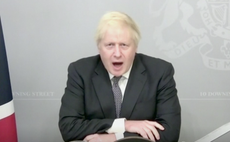Boris Johnson’s defence statement: what he said – and what he really meant
John Rentoul reads between the lines of the prime minister’s announcement that defence spending will be increased over the next four years


Your support helps us to tell the story
From reproductive rights to climate change to Big Tech, The Independent is on the ground when the story is developing. Whether it's investigating the financials of Elon Musk's pro-Trump PAC or producing our latest documentary, 'The A Word', which shines a light on the American women fighting for reproductive rights, we know how important it is to parse out the facts from the messaging.
At such a critical moment in US history, we need reporters on the ground. Your donation allows us to keep sending journalists to speak to both sides of the story.
The Independent is trusted by Americans across the entire political spectrum. And unlike many other quality news outlets, we choose not to lock Americans out of our reporting and analysis with paywalls. We believe quality journalism should be available to everyone, paid for by those who can afford it.
Your support makes all the difference.What Boris Johnson said: Mr Speaker, I will update the House on the government’s integrated review of foreign, defence, security and development policy.
And what he really meant: Mr Speaker, I will engage in low politics, trying to embarrass the Labour leader with the views of his predecessor, while giving the impression that I am running an important country, despite the chaos in my private office over the past few days.
What he said: For decades, British governments have trimmed and cheese-pared our defence budget.
What he meant: Whichever party has been in power for the past 10 years should hang its head in shame.
What he said: If we go on like this, we risk waking up to discover that our armed forces – the pride of Britain – have fallen below the minimum threshold of viability, and once lost, they could never be regained.
What he meant: If I keep talking, no one will notice that I’m talking nonsense. “Minimum threshold of viability”, indeed. Give a medal to the Ministry of Defence wallah who thought that one up.
What he said: So I refused to vindicate any pessimistic forecasters there have been by taking up the scalpel yet again.
What he meant: I gave the chancellor a bit of a talking to and he agreed to spend even more money he hasn’t got.
What he said: I have done this in the teeth of the pandemic, amid every other demand on our resources, because the defence of the realm, and the safety of the British people, must come first.
What he meant: I have done this because it is all funny money and my survival as prime minister must come first.
What he said: I pay tribute to my right honourable friends the chancellor and defence secretary, who believe in this as fervently as I do.
What he meant: The chancellor and defence secretary have been at each other’s throats, and to prove how important I am, I have decided in the defence secretary’s favour.
What he said: The international situation is now more perilous and intensely competitive than at any time since the Cold War.
What he meant: Nobody believes this, but the Labour Party is so frightened of its own shadow – in the form of Jeremy Corbyn, the independent MP for Islington North – that it has to support my attempt to look like a prime minister making important decisions.
What he said: My choice – and I hope it will carry every member of this House – is that Britain must be true to our history, to stand alongside our allies, sharing the burden.
What he meant: We must repeat the mistakes of our history, stand by the US come what may, and spend more than we can afford in the deluded belief that we are still a world power.
What he said: Extending British influence requires a once-in-a-generation modernisation of our armed forces, and now is the right time to press ahead.
What he meant: Restoring my influence in the Tory party requires a big, bold announcement, and I will now invent some reasons for doing it today.
What he said: Because emerging technologies, visible on the horizon, will make the returns from defence investment infinitely greater.
What he meant: Returns on investment? From defence spending? Another medal for the genius who thought that one up.
What he said: The latest advances will multiply the fighting power of every warship, aircraft and infantry unit many times over.
What he meant: The more we spend, the better value for money we will obtain. You can get 25 per cent off if you buy a 12-bottle case of Tignanello.
What he said: Our warships and combat vehicles will carry “directed energy weapons”, destroying targets with inexhaustible lasers and for them the phrase “out of ammunition” will become redundant.
What he meant: Whizzo. Just like a computer game.
What he said: The returns will go far beyond our armed forces. From aerospace to autonomous vehicles, these technologies have a vast array of civilian applications, opening up new vistas of economic progress, creating 10,000 jobs every year – 40,000 in total – levelling up across our country.
What he meant: Quite an expensive job-creation scheme, I think Rishi muttered in one of our meetings.
What he said: We shall use our extra defence spending to restore Britain’s position as the foremost naval power in Europe.
What he meant: I ignored Rishi asking awkward questions about why we need two aircraft carriers.
What he said: This will spur a renaissance of British shipbuilding across the UK – in Glasgow and Rosyth, Belfast, Appledore and Birkenhead – guaranteeing jobs and illuminating the benefits of the Union in the white light of the arc-welder’s torch.
What he meant: We must build ships we don’t need because the Scottish people show alarming signs of supporting independence.
What he said: We shall reshape our army for the age of networked warfare.
What he meant: We shall spend more money.
What he said: We shall invest another £1.5bn in military research and development, designed to master the new technologies of warfare, and we will establish a new centre dedicated to Artificial Intelligence and a new RAF Space Command, launching British satellites and our first rocket from Scotland in 2022.
What he meant: Robot spies! The militarisation of space! What could possibly go wrong?
What he said: Our plans will safeguard hundreds of thousands of jobs in the defence industry.
What he meant: Our defence policy is dictated by fear of unemployment and Scottish separatism.
What he said: We all take pride in how British resolve saved democracy in 1940.
What he meant: Many of us live in the past.
What he said: British internationalism – directed by Clement Attlee – helped to create Nato and preserve peace through the Cold War.
What he meant: Some of us even take an interest in ancient disagreements in the Labour Party, not that we are remotely scared of it.
What he said: Now we have a chance to follow in this great tradition, to end the era of retreat, transform our armed forces, bolster our global influence, unite and level up across our country, protect our people, and defend the free societies in which we fervently believe.
What he meant: Those socialists David Cameron and Theresa May shouldn’t have cut the defence budget. By making impossible spending promises and retreating from the EU, I shall end the era of retreat.


Join our commenting forum
Join thought-provoking conversations, follow other Independent readers and see their replies
Comments